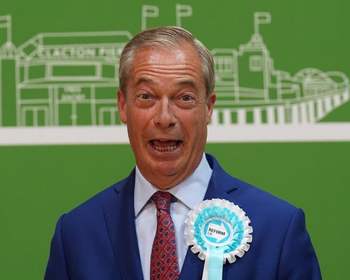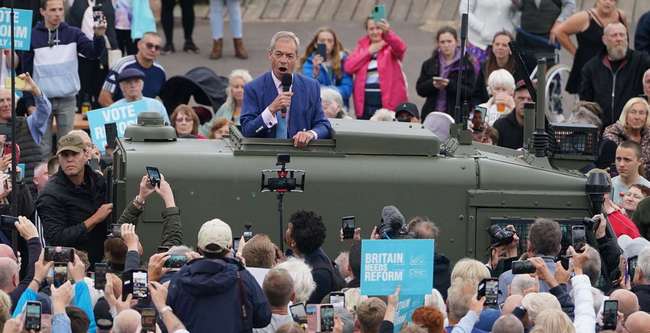Where Farage won
A leprous body rots not from the head but from the extremities: this applies also to our diseased body politic. Starved of the lifeblood of economic activity, England’s forgotten peripheral towns have become necrotic tissue, an economically irrelevant expulsion of the disabled, the unemployed, the retired, along with a sufficient garrison of minimum-wage staff to run the tills and dole counters and care homes: the underpaid and the undermourned.
 Welcome to Clacton
Welcome to Clacton
A decision was made, long ago, to arrange matters in this way, first under Thatcher and then under New Labour and subsequent governments. The focus would be the City, and such industries that were most profitable to export such as the arms trade, and the rest of the nation’s economy that was ill-served by this focus would be maintained by subsidy and the dole, paid with largesse from profits. Then once this policy was in place the other shoe dropped and the subsidy was withdrawn. A wildly unequal society emerged where a regional working class possessing only the ability to labour found no one who would buy, and no one who would make up the difference. There is a profitable economic axis from London to Liverpool with industry either side of the line: agricultural labour in the shires; but at the periphery there is despair brought and compounded by the arrival of uneconomic migrants who can no longer afford to live alongside those who still have wages.
These inward migrants of course blame immigrants of a darker hue for their troubles. A classic case of a post-hoc argument, whereby cheap labour arriving in the economic centres coinciding with the displacement of English workers is treated as a cause. And there is a certain reason: arriving workers are simply better skilled and less organised, commanding lower wages and conditions for a given productivity. Instead of insisting on integrating new arrivals, as workers in the core are wont to do, they blame them for their troubles. Which is why they can be found abusing lifeboat crews and hapless seaborne migrants, resisting the immigrant wave across the South Coast like so many latter-day Cnuts.
This is the classic view, but there are significant mitigations. For example, during the Corbyn years the Clacton Labour branch as least trebled in size, hardly a sign of universal right-wing opinion. In local politics, Clacton has one Labour ward, largely of local people who work in the town. Jaywick, which one would think the most viscerally aggrieved, returned two independents, at least one of which is of a left-Labour bent and a former Labour councillor. The trend for much of the town, however, is for Conservative councillors in the business town wards but pro-Brexit independents dominating most of the just-scraping-by residential areas of the town, who are by and large expelled Conservatives. Further out, like some political chromatography experiment, the countryside is Tory, the villages are LibDem, and neighbouring Harwich and Dovercourt, being a working town, is pretty solidly Labour. So there’s nothing in the sea air that necessarily drives the Reform/UKIP vote. Inland, political views normalise. And where there is local economic activity, politics arguably fall almost as Left as one can expect south of the Wash. Brexit and anti-immigrant politics express themselves partially across the dispossessed, but mainly the displaced from London, and mainly east London, who are arguably the plague carriers, self-employed traders such as plumbers but also East End retirees migrating down the A12 corridor, bringing the knuckle-dragging Alf Garnet politics of the I’m-all-right-Jack boomer generation. Meanwhile the spouses of such workers are under pressure to, well, espouse their spouses’ views for the sake of a quiet life.
Electoral evidence
This picture tends to be supported by the electoral evidence. It is hard to recall, fifteen years on, how significant the BNP was in the 2010 general election: the year the Clacton constituency was formed, now separated from the more industrial (and Labour) Harwich. They received 4.6 percent in Clacton, but in the East End of London Nick Griffin achieved a record 14.6 percent of the Barking vote. Dagenham and Rainham was their second most successful at 11.2 percent; Thurrock at 7.9 percent, Upminster at 6.4 percent, Basildon 5.6 percent, Romford at 5.2 percent, all kept their deposits. The BNP imploded after 2010, but the hate they had inhabited and encouraged lingered, and as the years passed this rough beast shuffled along the road towards Clacton, waiting to be reborn.
If we look at the Clacton general election results we find the following. In 2010 the Tories won 53 percent, Labour 25 percent, LibDem 12.9 percent, BNP 4.6 percent, and ‘Tendring First’ (a grouping expelled from the Conservatives) 2.5 percent. In 2014 the Conservative MP, Douglas Carswell, switched to UKIP and forced a by-election which he won with 59.7 percent, with Conservative Giles Watling on 24.6, and Labour with 11.2 percent. The LibDems had collapsed to 1.3 percent. In 2015 Carswell kept the seat for UKIP with 44.4 percent as opposed to 36.7 percent for the Conservative candidate. In 2017 Carswell didn’t stand, Watling secured 61.2 percent for the Conservatives, but Labour got 25.2 percent with a local (now Green) Left candidate, and UKIP trailed at 7.6 percent with a new candidate. In 2019 Watling gained 72.3 percent of the vote, Labour 15.5 percent under a centre-right unknown (the initial Left candidate was smeared as an antisemite and replaced by head office), the LibDems won 5.8 percent, the Greens creeping up on 2.8 percent. Which brings us to the current 2024 result with Farage on 46.2 percent for Reform, Watling for the Conservatives on 27.9 percent, a foisted (but later withdrawn for apparently being too charismatic!) Labour candidate on 16.2 percent, and the LibDems on 4.4 percent and Greens on 4.2 percent. There was an additional 1 percent for two disgruntled UKIPpers standing as independents: one had been the Reform candidate before Farage thrust him aside.
So, wading through the data, the right-wing vote in Clacton (Con, UKIP, Reform, BNP, Independent) was 61 percent in 2010 but has been steady at about 75 percent since. There was a pulse of personal and UKIP support in 2014 and 2015 for Carswell’s candidacy which may have helped drive further into the rump vote for a few extra percent. 2017 was left-Labour’s year under Corbyn, gaining fully 10 percent from the Conservative vote, but sinking back later to an average 15 percent. And in 2024 the right-wing vote was arguably ‘average’ for the seat. Farage didn’t take votes off Labour, LibDem or Green (who increased their vote by 50 percent with left-Labour votes), he simply split the Conservative vote, doing much worse than Carswell did for UKIP a decade ago. Both right and left have radicalised, the right to Reform and the left to the Greens, while a 10 percent vote, rootless since the LibDem’s self-immolation, has swung to Carswell, to Corbyn, and now straddles LibDem and Green.
 How did he do it?
How did he do it?
As a Clacton resident, I can speak to how the trick was done. Money. They rented prime town space for a campaign office, just round the corner from the Wetherspoons pub. There were the Reform leaflets. Then there were several ‘personal communications’ from supposed private citizens, like a doctor begging us to vote Reform to save the NHS. As well as enormous and copious signage, there were A-frame flatbed lorries with mobile signs, at least one with a massive TV display, and also parked on prominent bridges, across not just the constituency but the surrounding council area. And of course the celebrity factor of Farage’s name. And, as Channel 4 discovered, racists from London come down to spread their filth door to door.
In conclusion, there hasn’t been a shift to the right. There has been a shift rightwards within the right (and, within the left, leftwards), while 10 percent of voters will vote for anything that looks fresh. While Thatcher defeated the National Front by stealing their policies, so the far right has metastasised within the Conservatives and Farage is holding what now amounts to an internal debate. But whereas many Northern towns can see the same right-wing voters emerge in the same place decades later, London has flung its white, politically dispossessed to the coastal periphery. In the end, Clacton’s political change may depend on probate as a resentful post-war generation, that watched the Empire fall and colonials progress to equals, and then shuffled to the coast to retire, shuffles a little further off.
CLACTONIAN
